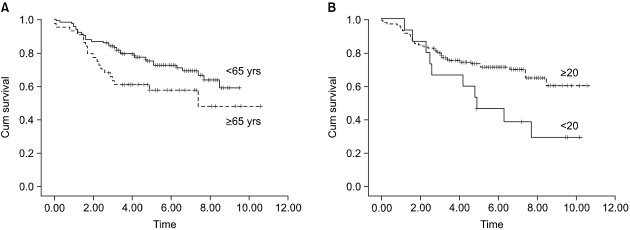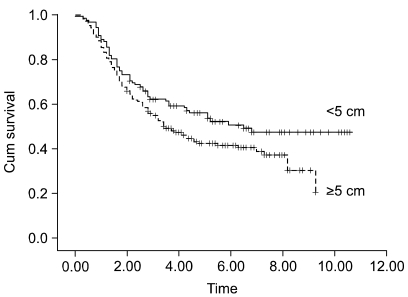Cancer Res Treat.
2006 Feb;38(1):13-18.
Prognostic Factors for Advanced Gastric Cancer: Stage- stratified Analysis of Patients who Underwent Curative Resection
- Affiliations
-
- 1Department of Surgery, Korea University College of Medicine, Seoul, Korea. yjmok@korea.ac.kr
Abstract
- PURPOSE
Advanced gastric cancer patients have a poorer prognosis as compared to the patients with early gastric cancer. This study was conducted to define the prognostic factors for advanced gastric cancer.
MATERIALS AND METHODS
606 patients with advanced gastric cancer who underwent curative gastric resection at our hospital were retrospectively examined. The patients were divided into two groups: group 1 was comprised of patients with a survival time <5 years, and group 2 patients had a survival time > or = 5 years. We compared clinicopathological characteristics of the two groups by performing univariate and multivariate analysis. We also investigated the prognostic factors according to the stage.
RESULTS
On univariate analysis, 7 factors (age, tumor size, Borrmann type, resection type, distal resection margin, depth of invasion and lymph node status) were found to be different, and multivariate analysis revealed that patient age, depth of invasion and lymph node metas tasis were the only significantly differences between the two groups. On the other hand, age and the Borrmann type for stage I b patients, age and the number of retrieved lymph nodes for stage II patients, tumor size for stage III patients, and the type of resection for stage IV patients were found to be the independent prognostic factors.
CONCLUSION
The age of patients had prognostic value in the early stages of advanced gastric cancers such as stage I b or II. The number greater than 20 retrieved lymph nodes affected the survival, particularly for the patients with stage II disease, and the tumor size was a significant prognostic factor for patients with stage III disease. Therefore, physicians are advised to pay special attention to lymph node dissection for those patients with stage II or III disease.
Keyword
MeSH Terms
Figure
Reference
-
1. Desai AM, Pareek M, Nightingale PG, Fielding JW. Improving outcomes in gastric cancer over 20 years. Gastric Cancer. 2004; 7:196–203. PMID: 15616767.
Article2. Hansson LE, Sparen P, Nyren O. Survival in stomach cancer is improving. Ann Surg. 1999; 230:162–169. PMID: 10450729.
Article3. Kikuchi S, Katada N, Sakuramoto S, Kobayashi N, Shimao H, Watanabe M, et al. Survival after surgical treatment of early gastric cancer: surgical techniques and long-term survival. Langenbecks Arch Surg. 2004; 389:69–74. PMID: 14985987.
Article4. Soetikno R, Gotoda T, Nakanishi Y, Soehendra N. Endoscopic mucosal resection. Gastrointest Endosc. 2003; 57:567–579. PMID: 12665775.
Article5. Shimizu S, Noshiro H, Nagai E, Uchiyama A, Tanaka M. Laparoscopic gastric surgery in a Japanese institution: analysis of the initial 100 procedures. J Am Coll Surg. 2003; 197:372–378. PMID: 12946791.
Article6. Japanese Gastric Cancer Association. Japanese classification of gastric carcinoma. Gastric Cancer. 1998; 1:10–24. PMID: 11957040.7. Sobin LH, Wittekind CH. UICC TNM classification of Malignant Tumors. 1997. 5th ed. New York: Wiley-Liss.8. Siewert JR, Bottcher K, Stein HJ, Roder JD. Relevant prognostic factors in gastric cancer: ten-year results of the German Gastric Cancer Study. Ann Surg. 1998; 228:449–461. PMID: 9790335.9. Noh SH, Yoo CH, Kim YI, Kim CB, Min JS, Lee KS. Result after a gastrectomy of 2,603 patients with gastric cancer: Analysis of survival rate and prognostic factor. J Korean Surg Soc. 1998; 55:206–213.10. Yi SH, Kim HC, Lee SH, Park HC, Yoon C, Joo HZ, et al. Multivariate analysis of prognostic factors in gastric cancer. J Korean Surg Soc. 1999; 56:75–83.11. Msika S, Benhamiche AM, Jouve JL, Rat P, Faivre J. Prognostic factors after curative resection of gastric cancer. A population-based study. Eur J Cancer. 2000; 36:390–396. PMID: 10708942.12. Kim JP, Lee JH, Kim SJ, Yu HJ, Yang HK. Clinicopathologic characteristics and prognostic factors in 10,783 patients with gastric cancer. Gastric Cancer. 1998; 1:125–133. PMID: 11957056.13. Nakamura K, Ueyama T, Yao T, Xuan ZX, Ambe K, Adachi Y, et al. Pathology and prognosis of gastric carcinoma. Findings in 10,000 patients who underwent primary gastrectomy. Cancer. 1992; 70:1030–1037. PMID: 1515980.
Article14. Kikuchi S, Hiki Y, Shimao H, Sakakibara Y, Kakita A. Tumor volume: a novel prognostic factor in patients who undergo curative resection for gastric cancer. Langenbecks Arch Surg. 2000; 385:225–228. PMID: 10857495.
Article15. Yook JH, Oh ST, Kim BS. Clinicopathological analysis of Borrmann type IV gastric cancer. Cancer Res Treat. 2005; 37:87–91.
Article16. Park SS, Kim SH, Kim SJ, Kim CS, Mok YJ. Outcome of surgical treatment for Borrmann type 4 gastric cancer. J Korean Gastric Cancer Assoc. 2003; 3:221–225.
Article17. Doglietto GB, Pacelli F, Caprino P, Sgadari A, Crucitti F. Surgery: independent prognostic factor in curable and far advanced gastric cancer. World J Surg. 2000; 24:459–464. PMID: 10706920.
Article18. Pinto-de-Sousa J, David L, Seixas M, Pimenta A. Clinicopathologic profiles and prognosis of gastric carcinoma from the cardia, fundus/body and antrum. Dig Surg. 2001; 18:102–110. PMID: 11351154.
- Full Text Links
- Actions
-
Cited
- CITED
-
- Close
- Share
- Similar articles
-
- The Prognosis of Patients with Stage IV Gastric Carcinoma without Distant Metastasis
- Prognostic Factors on Overall Survival in Lymph Node Negative Gastric Cancer Patients Who Underwent Curative Resection
- Factors Affecting Long Term Survival after Gastrectomy for Stage IV Gastric Cancer
- Risk Factors of the Recurrence after a Curative Resection of Gastric Carcinoma Invading the Muscularis Propria
- Results of Surgical Treatment for Advanced Gastric Cancer Analysis of prognostic factors





